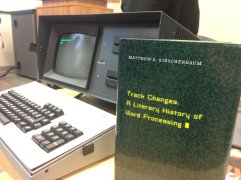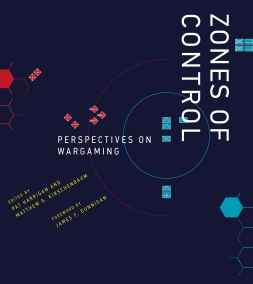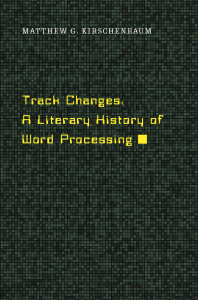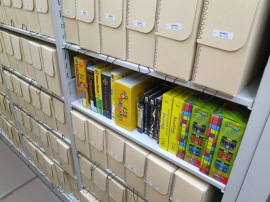Matthew G. Kirschenbaum
University of MarylandTracking Track Changes

For news and updates related to my recently published book, Track Changes: A Literary History of Word Processing, please see my Tumblr site.
Rosenbach Lectures
I recently gave the 2016 Rosenbach Lectures in Bibliography at the University of Pennsylvania, under the collective title of Bitstreams: The Future of Digital Literary Heritage. All three nights are now available for viewing. The book version of the lectures is under contract to the University of Pennsylvania Press.
The Transformissions of the Archive: Literary Remainders in the Late Age of Print
The Poetics of Macintosh: Recovering the Digital Poetry of William Dickey and Kamau Brathwaite
The RESTless Book: Bibliography and Bookish Media
Two New Books this Spring

Very excited for two new books coming out this spring: Track Changes: A Literary History of Word Processing, due out from Harvard/Belknap in early May 2016 (approx. 340 pages with over 20 photographs), and Zones of Control: Perspectives on Wargaming, an 800-page (!) anthology with almost 70 contributors and over 100 illustrations co-edited with the incomparable Pat Harrigan, due out from the MIT Press in late April (and part of the exciting new Game Histories series at the Press). Both are currently available for pre-order.
New Essay: “What is ‘Digital Humanities,’ and Why Are They Saying Such Terrible Things about It?”
Available here is the full text of an essay published in differences 25.1 (2014) as part of a special issue entitled In the Shadows of the Digital Humanities edited by Ellen Rooney and Elizabeth Weed. Duke UP’s publishing agreements allow authors to post the final version of their own work, but not using the publisher’s PDF. The essay as you see it here is thus a PDF that I created and formatted myself from the copy edited file I received from the press; subscribers, of course, can also read it in the press’s published form direct from the Duke UP site.
Other than accidentals of formatting and pagination this text should not differ from the published one in any way. If there are discrepancies they are likely the result of final copy edits just before printing—I’d appreciate having them pointed out. These and other comments can be entered below or sent to me via email. This essay is copyright (c) 2014 Duke University Press.
Abstract:
Accepting that the “Digital Humanities” under discussion is a discursive construct rather than “actually existing projects” (a clarifying phrase I lift from Rita Raley), my argument here suggests that this construct is too often indulged at the expense of in situ critique of actual projects, as well as papers, publications, syllabi, and so forth. We inhabit the construct when we forgo these normative products of academic labor in favor of the terrible things of my title, things that are said near-daily on blogs, lists, and Twitter: Digital humanities is a nest of big data ideologues. Like Johnny, digital humanities won’t read. Digital humanities doesn’t do theory. Digital humanities never historicizes. Digital humanities doesn’t do race, class, gender, or, for that matter, culture. Digital humanities is complicit. Digital humanities is a neo-liberalist contrivance for dismantling the professoriate. Digital humanities is the academic import of Silicon Valley solutionism. Perhaps most damning of all: digital humanities is something separate from the rest of the humanities, and—this is the real secret—digital humanities wants it that way. Yet the zero-sum agon of the construct seems itself complicit in a world view that is neo-liberal, ahistorical, and unconcerned with the materialities of contemporary scholarly production. Sometimes, and not incidentally, the construct can even resemble the virtualized Kung Fu arena of the Matrix that was called by the same name. This essay, the third of what has become an unplanned trilogy, explains why.
Cluster of Recent Work on Software Preservation
Those who follow my work will know that I’ve been focused for a while on issues around the preservation and scholarly investigation of a variety of different kinds of born-digital materials, from electronic manuscripts to video games and virtual worlds. I’ve tried to be a bridge between the professional practitioners in the archives community and conversations ranging from digital forensics to media archaeology and textual scholarship. Recently, I’ve found myself engaged specifically with the problem of software as a class of born-digital materials: executable content. There’s been a rise in the level of community engagement around this topic, and some even more exciting developments are in the works. Here, however, I’ve grouped my contributions to this emerging discussion.
Last May, the Library of Congress sponsored a two-day meeting called Preserving.exe, dedicated to jumpstarting a national strategy around executable content. I reported on the meeting for Slate magazine in a piece called “History.exe“; my editor then asked me if I would be willing to put myself out there with my own “Top 10” pieces of software I thought deserved long-term preservation, which I did: “The 10 Most Influential Software Programs of All Time.” The comments are the best part (really: my list was merely a pretense and catalyst for discussion, and, as expected, there are some awfully good suggestions in there). The official report from the Preserving.exe meeting is now out (PDF), and contains essays by Henry Lowood, Alice Allen, Peter Tueben, and myself. My piece, entitled “An Executable Past: The Case for a National Software Registry” (pages 12-22) offers a rationale for such an effort modeled (albeit with some crucial distinctions) on the well-publicized activities of the National Film Registry.
Back in September, Rhizome hosted a panel discussion at the New Museum on “Born-Digital Conservation in the Computer Age” featuring myself, Lori Emerson, and pioneering video and computer graphics artist Lilian Schwartz. We had a wide-ranging discussion, ably steered by Ben Fino-Radin (video of the event was recorded but is not currently available). Meanwhile, text of my remarks at the Library of Congress’s Electronic Literature Showcase last April is just downstream here: “Confessions of an Incunk.” In them I focus on electronic literature as software and executable content.
Finally, a long essay entitled “The .txtual Condition: Digital Humanities, Born-Digital Archives, and the Future Literary” is now out in Digital Humanities Quarterly. Among other things, the piece offers an intervention in the OAIS reference model by way of Wolfgang Ernst and media archaeology.

